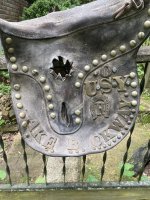Cubfan64
Silver Member
- Feb 13, 2006
- 2,986
- 2,790
- Detector(s) used
- Fisher CZ21, Teknetics T2 & Minelab Sovereign GT
- Primary Interest:
- All Treasure Hunting
reckon that those mountains still hold plenty of secrets if one can separate the truthful from the fanciful
And that in a nutshell is what keeps "Coronado's Children" dreaming. I can say for myself at least, very few nights go by that I don't fall asleep thinking about one place or another that I'd like to explore and wondering what I might find there.










